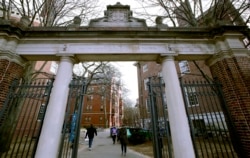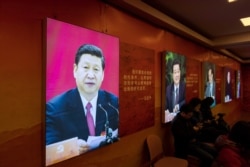Student Union
Chinese Law Professor Fired for Views Receives Harvard Job Offer
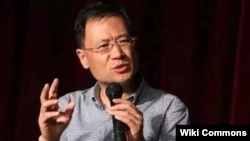
Outspoken Chinese legal scholar Xu Zhangrun has received an invitation from Harvard University to be a researcher at the school's Fairbank Center for Chinese Studies (FCCS), weeks after being fired by his former employer, Tsinghua University, for articles critical of President Xi Jinping.
According to friends, Xu received an unofficial invitation from Harvard on August 7; on August 13 he received an official FCCS offer letter as an associate in research for the 2020-21 school year.
"We have much respect for Professor Xu's academic work," James Evans, the center's communications officer, told VOA's Mandarin service via email. "We thought it appropriate to make a gesture of support in light of recent developments, and therefore invited him to apply for an affiliation with us."
While the associate-in-research affiliation is ordinarily granted in response to a request by the scholar, Evans said FCCS found "it would be an effective way to express support for Prof. Xu in a timely fashion."
Xu wrote back to the center on Wednesday, thanking FCCS for the offer, saying it was "a substantive appointment that addresses the very core of my interests."
Just days ago, Xu received the Notice for Unemployed Individual from his former employer, the prestigious Tsinghua University, officially finalizing termination of his contract. In addition to writing critical articles, Xu was detained for a week in early July on charges of soliciting prostitutes in the southwestern city of Chengdu last year, which he denied.
Xu, who was barred from leaving China, had taught at Tsinghua University's law school for over two decades. In a series of articles published over the past few years, Xu has harshly criticized Xi, accusing him of moving toward authoritarianism since coming to power in 2012 and blaming him for China's political, economic and cultural setbacks.
Observers cheer Harvard
Professor Jerome Cohen, founder of New York University's U.S.-Asia Law Institute, called Harvard's invitation to Xu "a brilliant move" that raises the question of whether other research organizations should also extend invitations to rights activists in China.
"I have long thought that I should limit my contacts with distinguished human rights people in China, because it might add to their problems," Cohen told VOA Mandarin.
"But I see now, perhaps we should take the opposite approach and we should be inviting many of the great people in China who are oppressed or restricted in their activities to be associated with our research institutes," he said. "I see what it has done for Professor Xu. He has put out a wonderful, extremely interesting essay in response to the honor Harvard extended to him. It is obviously a psychic income. It has given him greater resistance and greater strides in his struggle against oppression."
Boston University political scientist Joseph Fewsmith, also an FCCS researcher, told VOA the Harvard center has a history of providing shelter for oppressed scholars, and that he welcomes Xu's arrival.
Chinese legal scholar Yu Ping said the move shows that Harvard's relationship with Beijing is evolving.
"They stood up to the CCP at such a critical moment, I think it shows their dissatisfaction with CCP's punishment towards Xu," he told VOA. In the past, he said, FCCS was sometimes reluctant to engage in political debates that could disrupt its relationship with Beijing, and the public support for Xu shows "a change of attitude."
Yet Lu Nan, a U.S.-based political commentator who is friends with Xu, said the Beijing authorities will not allow Xu to leave the country.
"I am 100% sure Xu's freedom of movement will be controlled," Lu told VOA. "Xu knows this — he can't physically leave China."
Recently, many liberal scholars have been forbidden to leave China. In 2018, Hong Sheng, director of the liberal think tank Unirule Institute of Economics, was told at the airport that he was not allowed to leave China to attend a conference in the U.S. on China's economic reform. The reason given to him was that the trip "threatens China's national security."
Lu added that he expects Xu will not give in to the authorities and is prepared for further persecution.
This story originated in VOA's Mandarin service.
See all News Updates of the Day
Proposed settlement offered over financial aid allegations
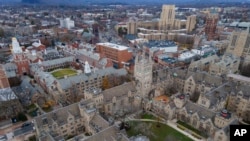
A group of U.S. colleges and universities have agreed to settle a lawsuit alleging deceptive financial aid tactics, according to a report published in The Hill.
The schools would pay $284 million to plaintiffs who were enrolled full-time and received financial aid between 2003 and 2024.
The schools have denied the allegations. (April 2024)
Universities in Middle East building research relationships with China

As China bolsters research relationships with universities in the Middle East, the United States has taken notice – especially when that research involves artificial intelligence.
Reporting for University World News, Yojana Sharma has the story. (March 2024)
Tips for staying safe while studying in the US
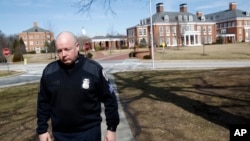
Recent news events have raised safety concerns among some international students studying in the United States.
Adarsh Khandelwal, writing in the India Times, has tips for staying safe from the moment you arrive until the day you complete your studies. (March 2024)
Some colleges are making digital literacy classes mandatory

A 2019 study by Stanford found that most college students can’t tell the difference between real and fake news articles. Amid rampant online disinformation, and the threat of AI-generated images, some schools are making students learn “digital literacy” to graduate.
Lauren Coffeey reports for Inside Higher Ed. (March 2024)
With federal student aid delays, students aren’t sure what college will cost
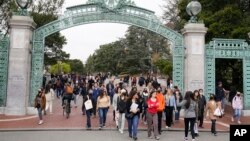
The U.S. Department of Education’s federal student aid form (FAFSA) experienced serious glitches and delays this year.
Now, many students have been admitted to college, but don’t know how much money they’ll need to attend.
Read the story from Susan Svrluga and Danielle Douglas-Gabriel for The Washington Post. (March 2024)




